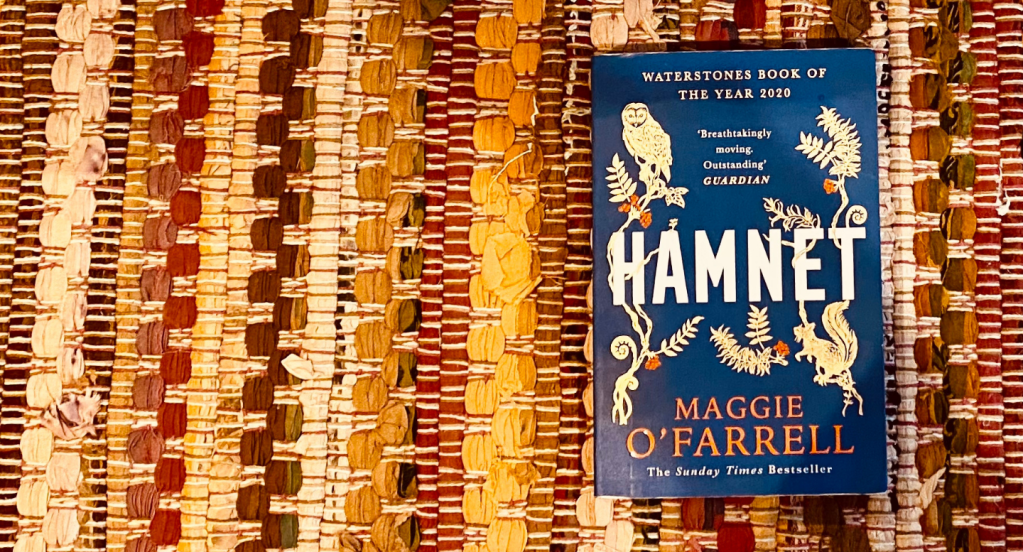Well. It’s been a minute. Safe to say that since lockdown disappeared into the ether, my social life has simultaneously rematerialised. Ironic, really, that my last post was all about my hermit life. However, since I’ve been plunged back into a temporary isolation ahead of a hospital appointment, now seems like as good a time as any to revive the old blog once again.
I’m well aware that I usually try and write these “What I’ve been reading” blogs at the beginning of the month, when the reads are still fresh in my mind – and in fact, I did start writing this around a week ago – but I think in this case, the extra time has given me a bit more clarity on this particular novel. Whether or not that will be reflected in clarity of writing is another story entirely, but we’ll give it a go anyway.
October’s (and indeed September’s) read was Hamnet by Maggie O’Farrell, a novel that has been raved about for a little while now; even the bookseller in Waterstones rushed over to tell me I must read it when she saw me pick it up in the shop. And who am I to refuse?
Now, whilst I don’t necessarily get the hype after reading it (for reasons that hopefully will become clear) there is one thing I will give Hamnet – the language in this is beautiful. Shakespeare himself would be proud – relevant because it’s about Shakespeare’s son, in case you need some context. There is word magic at work in Hamnet when it comes to scene setting and character-building and human emotion. For that reason, it’s easy to see why there’s been so much love for the novel from critics and normal readers, like me, alike.
So what’s my problem? Simply, I came away from reading Hamnet thinking, “what’s the point?” I know art doesn’t always need to have a reason and storytelling isn’t just about tying everything up neatly at the end. But I’ve read a lot of other novels like this – novels that explore the psyches of their characters, observe human relationships and spend 75% of the time describing beautiful and poetic things for no real reason – and come away feeling fulfilled, like I’ve learned something or drawn conclusions for myself. Unfortunately, despite it’s literary-ness, I just didn’t get that same satisfaction from reading Hamnet.
That’s why I think in this particular case, it’s good I’ve left some time between the reading and the writing. I’ve had a chance to ponder the novel a bit more and ask myself why I didn’t feel content with Hamnet. And I think I’ve come to a conclusion, which is this: Hamnet is neither about the boy nor the play it’s named after. It’s about grief and family and marriage and the “drama” that plays out in everyday life. All good and interesting subject matter. But for me, not the main concern of this particular novel. Really, it should have been called “Agnes” (Shakespeare’s wife, Hamnet’s mother) because that’s who we’re really exploring here.
At its core, Hamnet becomes a story about motherhood, wifehood and sisterhood. Again, this is fine if that’s what the main focus is. But since we’re told from the start that this is about Hamnet and his namesake play, the female stories become secondary whilst at the same time making up the entire novel – there’s so much content about Agnes and her daughters that could have said so much more than it did. Whilst I wonder if this is perhaps intended as a comment on women’s position as secondary at the time, and so pertinent in that way, it’s frustrating as a reader (for me at least) that so much more could have been said.
With that being said, I think perhaps an exploration of femininity is not what Hamnet needed for me. A deeper dive into the psyche of Agnes and daughters would get lost in the many other stories we have of woman- and girl-hood. Whilst I am a huge lover of and advocate for those stories, what I think would have made this novel really stand out to me is an exploration of grief and the creative process. We get about ten pages at the end about how Hamnet’s death inspired Hamlet the play and if that’s what the novel’s about, why gloss over it so quickly? I get that we’ve had lots of interpretations and stories about Shakespeare over the years, so I see why he’s largely left out of the novel, and in fact, he’s never named – so as not to distract maybe. But I found this absence in itself distracting. I was waiting for him to be named, perhaps to find his creative identity through the grief of losing his son? Suffice it to say, we don’t get this.
So, to conclude my ramblings, I don’t think Hamnet‘s a bad novel, I think it tries to cover too much. I did enjoy reading this, for its beautiful language and, in many ways, well-crafted storytelling. What I wish it had was a more distinct reason for being. Like I said at the start, I know literature doesn’t have to have a point, but it should leave us with an idea of where the author was going, or at least the tools to draw our own conclusions. I have a lot of conclusions on what I would have liked the point to be, but I’m still a bit lost on what it actually is. Failing that, just give me more pretty words about the countryside and I’ll be happy.

Leave a comment